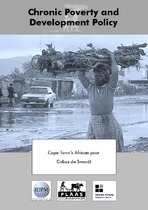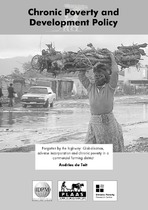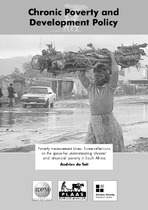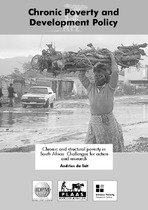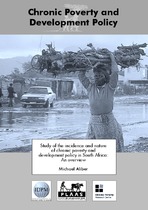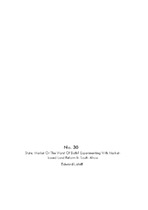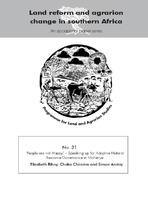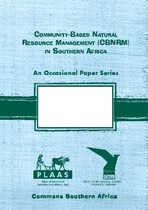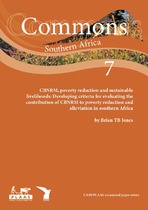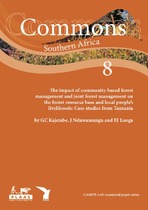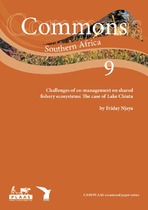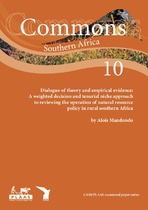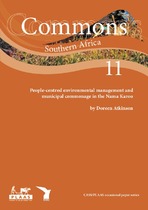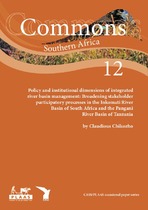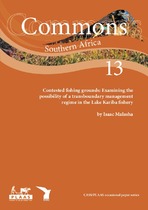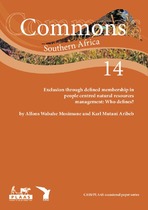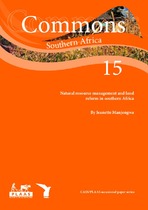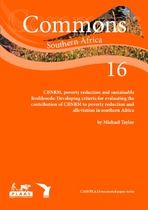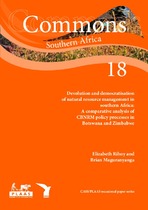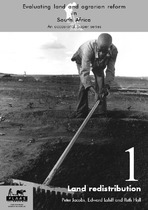Occasional Papers Series: Recent submissions
Now showing items 1-20 of 59
-
Cape Town's African poor
(Institute for Poverty Land and Agrarian Studies (PLAAS), 2004)The typical ‘face of poverty’ in South Africa is no longer that of a rural woman engaged in subsistence agricultural production. Poverty today also refers to the large number of unemployed men who wait daily in vain on ... -
Forgotten by the highway: Globalisation, adverse incorporation and chronic poverty in a commercial farming district
(Institute for Poverty Land and Agrarian Studies (PLAAS), 2004)This paper presents key findings from a livelihoods survey of households in four poor neighbourhoods in the Western Cape district of Ceres, one of the centres of South Africa’s deciduous fruit export industry (see Figure ... -
Poverty measurement blues: Some reflections on the space for understanding ‘chronic’ and ‘structural’ poverty in South Africa
(Institute for Poverty Land and Agrarian Studies (PLAAS), 2005)This paper explores the challenge of understanding chronic and structural poverty in South Africa, and questions the dominance of the econometric imaginary in present-day development and poverty studies. It argues that ... -
Chronic and structural poverty in South Africa: Challenges for action and research
(Institute for Poverty Land and Agrarian Studies (PLAAS), 2005)Ten years after liberation, the persistence of poverty is one of the most important and urgent problems facing South Africa. This paper reflects on some of the findings based on research undertaken as part of the participation ... -
Study of the incidence and nature of chronic poverty and development policy in South Africa: An overview
(Institute for Poverty Land and Agrarian Studies (PLAAS), 2001)The purpose of this study is fourfold: first, to summarise the current state of knowledge about chronic poverty in South Africa; second, to describe the range of existing governmental and civil society initiatives which ... -
State, market or the worst of both? Experimenting with market-based land reform In South Africa
(Institute for Poverty Land and Agrarian Studies (PLAAS), 2007)The concept of ‘market-based land reform’ (MBLR, also market-assisted land reform, or market-led agrarian reform) has been central to the ‘new wave’ of land reform that has been in evidence internationally since the early ... -
‘People are not happy’ – Speaking up for adaptive natural resource governance in Mahenye
(Institute for Poverty Land and Agrarian Studies (PLAAS), 2007)This paper explores the ongoing events surrounding the CAMPFIRE project of Mahenye in Zimbabwe within the context of the recent discourse of crisis within community based natural resource management (CBNRM) and crisis ... -
Constituting the commons in the new South Africa
(Institute for Poverty Land and Agrarian Studies (PLAAS), 2000)This set of papers results from participation by staff members of the Programme for Land and Agrarian Studies in the eighth biennial conference of the International Association for the Study of Common Property, held at ... -
CBNRM, poverty reduction and sustainable livelihoods: Developing criteria for evaluating the contribution of CBNRM to poverty reduction and alleviation in southern Africa
(Institute for Poverty Land and Agrarian Studies (PLAAS), 2004)This research paper has been prepared as part of the Centre for Social Studies (CASS), University of Zimbabwe/ Programme for Land and Agrarian Studies, University of the Western Cape (PLAAS) programme ‘Breaking New Ground: ... -
The impact of community-based forest management and joint forest management on the forest resource base and local people’s livelihoods: Case studies from Tanzania
(Institute for Poverty Land and Agrarian Studies (PLAAS), 2004)In recent years, there has been a move in eastern and southern African countries from centralised and state-driven management of natural resources towards decentralised and people-centred based regimes. In Tanzania, the ... -
Challenges of co-management on shared fishery ecosystems: The case of Lake Chiuta
(Institute for Poverty Land and Agrarian Studies (PLAAS), 2005)Fisheries co-management initiatives have been implemented in various water bodies of southern Africa since the 1990s (Geheb & Sarch 2002). A Participatory Fisheries Management Programme (PFMP) was introduced on Lakes ... -
Dialogue of theory and empirical evidence: A weighted decision and tenurial niche approach to reviewing the operation of natural resource policy in rural southern Africa
(Institute for Poverty Land and Agrarian Studies (PLAAS), 2005)Considerable research has been conducted on community-based natural resource management in rural southern Africa. Many interesting insights have accumulated from the literature on the research issues of earlier generations. ... -
People-centred environmental management and municipal commonage in the Nama Karoo
(Institute for Poverty Land and Agrarian Studies (PLAAS), 2005)Land reform is a key part of government policy, spurred politically by the claims of the landless, as well as the land reform pressures in countries like Zimbabwe. It is clear to national and provincial governments that ... -
Policy and institutional dimensions of integrated river basin management: Broadening stakeholder participatory processes in the Inkomati River Basin of South Africa and the Pangani River Basin of Tanzania
(Institute for Poverty Land and Agrarian Studies (PLAAS), 2005)In recent years, water governance has undergone a remarkable paradigm shift. Old notions of water resources management dominated by a supply-orientation and reliance on civil engineering science and technical solutions to ... -
Contested fishing grounds: Examining the possibility of a transboundary management regime in the Lake Kariba fishery
(Institute for Poverty Land and Agrarian Studies (PLAAS), 2005)Community-based natural resources management (CBNRM) programmes in the southern African region emerged as a reaction to colonial ‘fortress’ conservation policies that criminalised and marginalised local people, preventing ... -
Exclusion through defined membership in people-centered natural resources management: Who defines?
(Institute for Poverty Land and Agrarian Studies (PLAAS), 2005)This paper investigates how community-based natural resource management (CBNRM) has determined membership to rights over forestry and wildlife resources in Botswana, Namibia and Zimbabwe. The legal frameworks in these ... -
Natural resource management and land reform in southern Africa
(Institute for Poverty Land and Agrarian Studies (PLAAS), 2006)Throughout southern Africa, land holdings have remained significantly skewed between rich and poor, with discriminatory land tenure systems reflecting the land and agricultural policies adopted in colonial times and after ... -
Rangeland tenure and pastoral development in Botswana: Is there a future for community-based management?
(Institute for Poverty Land and Agrarian Studies (PLAAS), 2006)Botswana has a long history of attempts to ‘rationalise’ land tenure so as to improve livestock production, which remains a mainstay for the rural economy. This paper addresses the profound transformations in land tenure ... -
Devolution and democratisation of natural resource management in southern Africa: A comparative analysis of CBNRM policy processes in Botswana and Zimbabwe
(Institute for Poverty Land and Agrarian Studies (PLAAS), 2007)This paper examines the policy processes of devolution and democratisation of natural resource management as they relate to community-based natural resource management (CBNRM) outcomes in Botswana and Zimbabwe. Devolution ... -
Evaluating land and agrarian reform in South Africa : Land redistribution
(Institute for Poverty Land and Agrarian Studies (PLAAS), 2003)Land dispossession during the colonial era and the decades of apartheid rule produced a highly unequal pattern of land ownership and widespread rural poverty in South Africa. When a democratically elected government came ...

